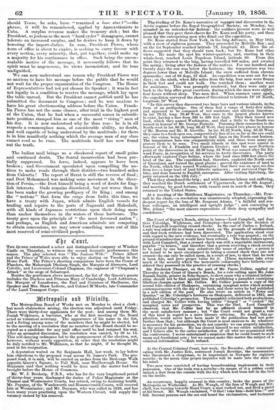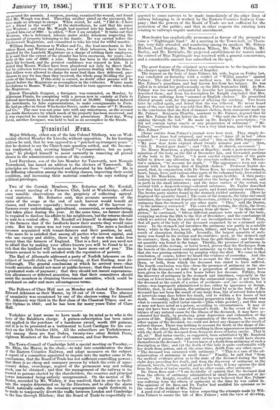Aittruptio aulE
The Metropolitan Board of Works met on Monday to elect a clerk ; but much obstruction arising, the election was adjourned until Friday. There were thirty-four applicants for the post ; and among them 30. Josiah Wilkinson, a banister, who at the first meeting of the Board, acted as volunteer secretary. The appearance of his name in the list, and a feeling among some of the members that he might be elected, led to the moving of a resolution that no member of the Board should be ac- cepted as a candidate for any paid office until he had resigned his seat.. After an animated discussion, the resolution was carried, by 20 to 15.. This self-denying ordinance led to the postponement of the election, not, however, without wordy opposition, in order that the resolution might be duly notified to Mr. Wilkinson, so that he might, if he thought fit, send in his resignation.
A deputation waited on Sir Benjamin Hall, last week, to lay before him objections to the proposed road across St. James's Park. The pro- posed road, it is said, will be carried on arches from the Bird-cage Walk opposite Queen's Square, to Pall Mall, near Marlborough House. Sir Benjamin said that nothing would be done until the matter had been brought before the House of Commons.
Mr. W. J. Broderip, F.R.S., who has for the very lengthened period of thirty-four years discharged the duties of Police Magistrate at the Thames and Westminster Courts, has retired, owing to declining health. Mr. Paynter, of the Wandsworth and Hammersmith Courts, will succeed him at Westminster ; and Mr. Dayman, who was called in 1829, and has been many years practising upon the Western Circuit, will supply the vacancy caused by his removal.
The reading of Dr. Kane's narrative of voyages and discoveries in the Arctic regions before the Royal Geographical Society, on Monday, ter- minated in an unlooked-for fashion : the auditors present were so well pleased that they gave three cheers for Dr. Kane and his party, and three more for the enterprising men who fitted out the expedition. Dr. Kane started from New York, in the brig Advance in May 1852, with a crew of eighteen persons. They proceeded by Melville Bay ; and on the 1st September reached latitude 78, longitude 43. Here the of- ficers suggested that they should turn back ; but Dr. Kane had other views. He made the spot his winter-quarters, and, starting in their whale-boat, reached Louis Napoleon Island, latitude 80. From this point they returned to the brig, having travelled 800 miles, and awaited the spring; living after the fashion of the natives. For one hundred and twenty days the sun was below the horizon ; the temperature was two degrees lower than at Melville Island ; the crew suffered from chronic spasmodia ; out of 60 dogs, 57 died. An expedition was seat out for ten days ; on the ninth, when fifty miles from the brig, four men were frozen in their feet and could not walk. One watched them ; another went for assistance. This was promptly rendered.; but they were only got back to the brig after great exertions, during which the men were eighty- four hours without sleep. Two men died. When summer came again,, the expedition surveyed the shores of Greenland to latitude 78° 10' North, longitude 70° West.
"In this survey they discovered. covered two large bays and various islands, in the, form of an archipelago. One of these had a range of forty-five miles, and appeared to be composed of red sandstone and &Melons limestone. In lat. 79.12, long. 70.40 West, they came to the largest glacier known to exist, having a face from 300 to 500 feet high. They then traced new land, which they named Washington, and that a little to the South was named in honour of Mr. George Peabody. Pursuing their researches to the South-west in lat. 80.20, long. 66.42 West, they named two places in honour of Mr. Morton and Mr. H. Greville. IE lat. 81,22 North, long. 65.25 West, they came to a fresh open sea, comparatively free of ice as far as the eye could see, the vision being interrupted by dark lines on the North-east horizon. The temperature here was comparatively mild, and there were many mi- gratory birds to be seen. Two small islands at this spot were named in honour of Sir I. Franklin and Captain Crozier; and the most Northern point of the discoveries in lat. 82.30 long. 65 West was named after Sir Ed- ward Parry, in recognition of his services in Arctic discoveries. - The party- afterwards explored Cape Sabine, where the land rises 2500 feet above the level of the sea. The expedition had, therefore, explored the North coast of Greenland, and turned the great glacier ; proved the existence of land * the North, which they named Washington • that there was an open sea free from ice—a large tract of land hitherto unknown - and surveyed Cape Sa- bine, and done honour to English enterprise. After visiting Spitzburg, the party returned on the 12th July."
Then they abandoned the brig ; and with immense labour and suffering, they reached the Dutch settlement of' Uppernavek, on the 6th August; and meeting, by good fortune, with vessels sent in search of them, they returned to the United States.
At a meeting of the Middlesex Magistrates, on Thursday,—Mr. Pow- nall in the chair,—a resolution was unanimously adopted, expressing the deepest regret for,the loss of Mr. Sergeant Adams, " a faithful and zea- lous colleague an intelligent and upright judge " ; and conveying to Mrs. Adams Ahe moat sincere expressions of their deep sympathy and condolence."
The Court of Queen's Bench, sitting in banco—Lord Campbell, and Jus- tices Coleridge, Wightman, and Crompton—have upheld the decision of Lord Campbell respecting crossed checks. In the case of Carlon v. Ireland, a. rule was asked for to obtain a new trial, on 'the grounds of misdirection and that fresh evidence had been discovered. The application stood over with regard to the new evidence, but eventually a rule was granted.; on the ground of misdirection it would have been refused. The three Judges agreed with Lord Campbell, that a crossed check was still a negotiable instrument,. payable "to bearer," and therefore that a person receiving a check crossed to be paid by one bank may substitute the name of another : a person is not bound to be more circumspect in taking a crossed check than one not crossed—he can only be called_upon, in a court of law, to show that he took it bon& fide, and gave Proper value for it. [These decisions take away much of the security which the mercantile community have hitherto con- sidered they possessed in the practice of crossing cheeks.] Sir Frederick Theeiger, on the part of Mr. Payne Collier, applied on Thursday to the Court of Queen's Bench, for a rule calling upon Mr. John. Russell Smith, printer in Soho Square, to show cause why a criminal inform- ation should not be filed against him for publishing a pamphlet containing libellous charges against Mr. Collier. Mr. Collier .possesses a copy of the second folio edition of Shakspere, containing marginal notes which seemed contemporaneous with the day of the book, and these notes he had published in a new edition of the poet. He also wrote an article in "Notes and Queries-" on Mr. Coleridge's Lectures on Shakspere, delivered in 1812, and published Coleridge's prospectus. Thepamphlet criticized both productions, and charged Mr. Collier with having either "forged " or " cooked " the marginal notes and prospectus. This was the libel. Lord Campbell observed, that Mr. Collier bad by an affidavit cleared. himself in the most satisfactory manner ; but " the Court could not grant a rule of this kind in regard to a mere literary criticism. No doubt, thin ap- plication would never have been made if the publication had not gone further than that • but although the Court is most anxious to do whatever is necessary for his protection, we do not consider we can properly in the present instance. He 'has cleared himself to my entire satisfaction, and I believe also to the entire satisfaction of all who are acquainted with the controversy. I never entertained a suspicion that he could- resort to such mean and fraudulent acts ; but we cannot make this matter the subject of a criminal iuformation."-Rule refused.
At the Central Criminal Court, last week, the Recorder, after communi- cating with Mr. Justice Erle, sentenced Joseph Berridge, the monomaniac who threatened a clergyman, to be imprisoned in Nee-gate for eighteen months : in the mean time proper inquiries will be made into the state of his mind.
Two men were convicted of having housebreaking implements in their possession. One of the tools was a novelty—by means of it a robber could unlock a door from the outside with the key which had been left in the lock on the inside.
An occurrence, happily unusual in this country, broke the peace of the Metropolis on Wednesday. As Mr. Waugh, of the firm of Waugh and Mit- chell, was turning towards Hand Court, a man rushed out, and fired a pistol at his breast. Mr. Waugh exclaimed, " 0 God ! take him—hold him !" and fell. Several persona saw the act and heard the exclamation, and hastening np secured the sag:main. A surgeon, passing, examined the wound, and found that Mr. Waugh was dead. Throwing another pistol on the pavement, the man made no attempt to escape. When seized, he said, " I did- it—T have not a friend in the world." At the stationhouse, he said that his name was Westron ; and that Mr. Waugh had married into his family, and had cheated him out of 8001.: he added, "Now I am satisfied." It turns out that Westron, who is deformed, labours under sickly delusions respecting the treatment of property belonging to his family. lle was carried- before the Clerkenwell Magistrate, and committed to take his trial for wilful murder.
William Burns, foreman to Walker and Co., the lead-merchants in Bel- videre Road, and Winter and Jones, two of their labourers, have been re- manded by the Lambeth Magistrate on a charge of robbing their employers. It is said that the extent of the plunder has been enormoua, for years—lat- terly at the rate of 50001. a year. Burns has been in the establishment since his boyhood, and the greatest confidence was reposed in him. It is stated that Messrs. Walker have been plundered not only by direct theft, but by collusion between the prisoners and persons dealing with the finn- that sellers were allowed to charge for more lead than they delivered, pur- chasers to pay for less than they received, the whole gang dividing the pro- ceeds of the frauds. If this story is correct, no doubt other persons will be placed before the Magistrate as accomplices in the robberies. Winter made revelations to Messrs. Walker'; but he refused to turn approver when before the Magistrate.
Ernest Theophile Guignet, a foreigner, was remanded, on Monday, by AldermanEmma, for conspiring with a person now in custody at Paris to defraud merchants in London of goods valued at 10,0001. Gmgnet induced the merchants, by false representations, to make consignments to Paris. He had an office in Great Winchester Street, under the name of " Maurice and Co." The case was not gone into with any minuteness, as the accused has made disclosures by which much of the property has been recovered, and it was expected he would further assist the prosecutors. Next day, Woog Javal, another foreigner, was held to bail as an accomplice in the frauds.































 Previous page
Previous page